What is a niche site? Like a niche in nature, a niche website focuses on a particular interest of a specific group within a larger market or broader category. This article will examine popular niche site examples and how they fit content and affiliate marketing strategies.
A profitable niche site is typically only used by those knowledgeable of the topic to answer questions or solve an issue exclusive to their industry. It may also link to an Amazon affiliate or use affiliate marketing for revenue.
Rather than focusing on singular experiences like a blog, niche sites offer information, and partnering can be very profitable. Once the site has a strong foundation and system, it can generate passive income.
Let's get into it.
What Any Niche Website Must Have
Before thinking of a niche site, consider the broader category it falls under. Sometimes, more than one related profitable niche—like branches on a tree—spreads beyond the main topic. For instance, a quality content site devoted to knitting would be considered a good niche site under the bigger umbrella of sewing, quilting, or textiles.
A site on tea is considered in the niche market because it may include subtopics on selecting and brewing tea and different filters, cups, kettles, etc. A site specifically on tea leaves would be considered a micro niche website. But a micro niche site may only have a limited amount of new information to add—not to mention fewer keywords and, therefore, less traffic.
In contrast, the blog niche site depth may allow for more content.
11 Successful Niche Site Examples
In creating a profitable niche site, identify popular searched-for categories, like health and fitness. This is a vast umbrella topic, with much more specific subtopics such as diet and training.
Below are examples of how niche marketing pares down different categories into more minor elements.
1. Keto diet
Any diet falls under the broader topic of nutrition and is considered niche. The search term “keto diet” produces about 153,000,000 results; common SEO keywords and phrases such as “lean foods” put independent blogs at the forefront, among definitions and history of the diet. For example, Hey Keto Mama's niche site has used its expertise effectively to attract a specific audience.
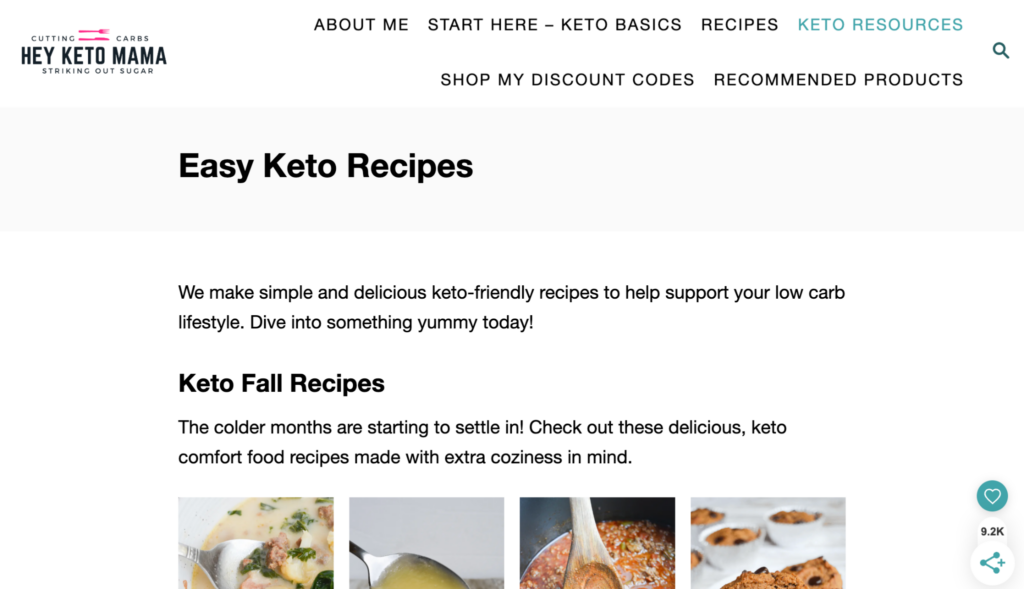
2. Rowing
Rowing is another niche topic that falls under the broader category of “sports” or even “water sports.” This is a topic few people search for, and those who do look for exclusive events or equipment. This niche site comes up almost immediately in the results and can cleverly host various aspects regarding rowing by titling itself “Rowing News.”

3. Tiny living/van life
Relatively trendy but still a new and limited interest, “tiny living/van life” is a niche that falls under various categories, like “sustainable living,” “cross-country,” or even “vacation.” So We Bought A Van is a niche independent blog with constant updates and tips for enthusiasts and the casually interested.

4. Camping gear
This niche site subtopic under the “great outdoors” umbrella may seem relatively straightforward—not to mention as vast as the main topic. But we can narrow it down to a subtopic of extreme specificities, such as gear for rock climbers who sleep suspended on ropes versus those who camp in the frigid tundra, the barren desert, or swampy conditions. For example, Switchback Travel’s expertise attracts a specific readership to its niche site, providing reviews and adventure information for a targeted audience.

5. Calligraphy
A specialized art form, calligraphy is just as niche as rock climbing sleep gear. This is because it’s a subtopic of a subtopic—under arts and crafts, within the category of typography, the deeper category of painting, or even symbolism.
This means the audience is devoted and specific and will come in with knowledge already—perhaps from a particular background, like graphic design or Asian studies—rather than randomly being pulled from a pool of idle browsers.
Beyond the historical context, a calligraphy niche site like Lettering Daily will likely be an enthusiast’s project or forum for others or may sell a unique service.

6. Quilting
Similarly, quilting is geared toward a particular demographic and has its own history and culture. Very different from calligraphy but also niche, Quilting Daily’s niche site can easily be updated with new pattern designs, material prices or quality comparisons, discussions, and any seminars or classes.
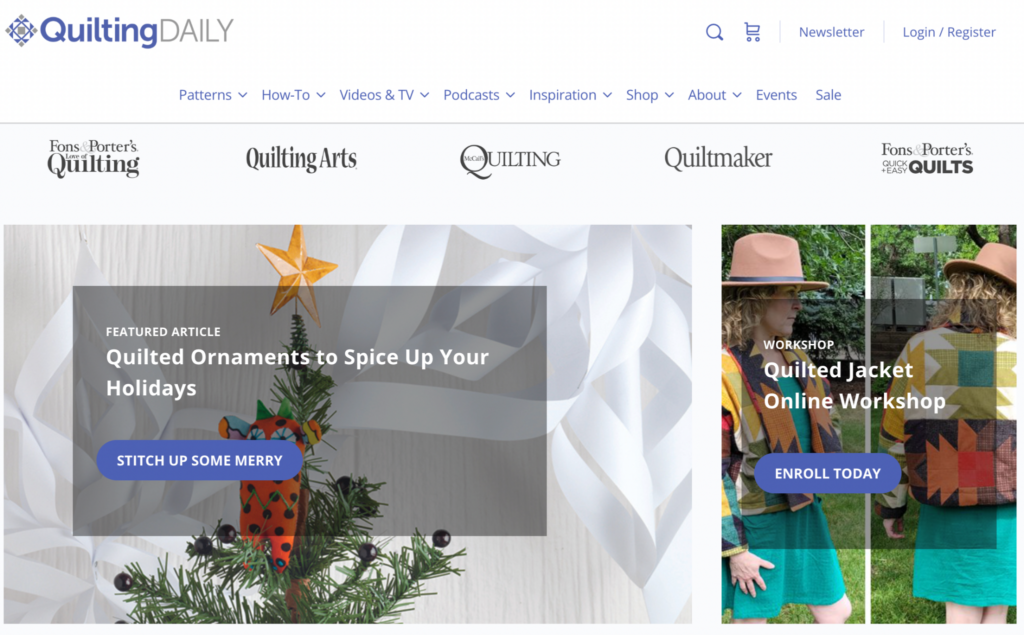
7. Running shoes
Don’t underestimate niche websites dedicated purely to products in addition to crafts or hobbies. As with camping gear, any product-based niche site can be built from overlapping content: running events and news, the athletes who wear the gear, different seasonal terrains, or shoe preferences.
“Shoe” is already a niche category of “fashion”; “running” is a niche category of sports. Run Repeat combines the two, offering products and reviews for popular running shoe brands.
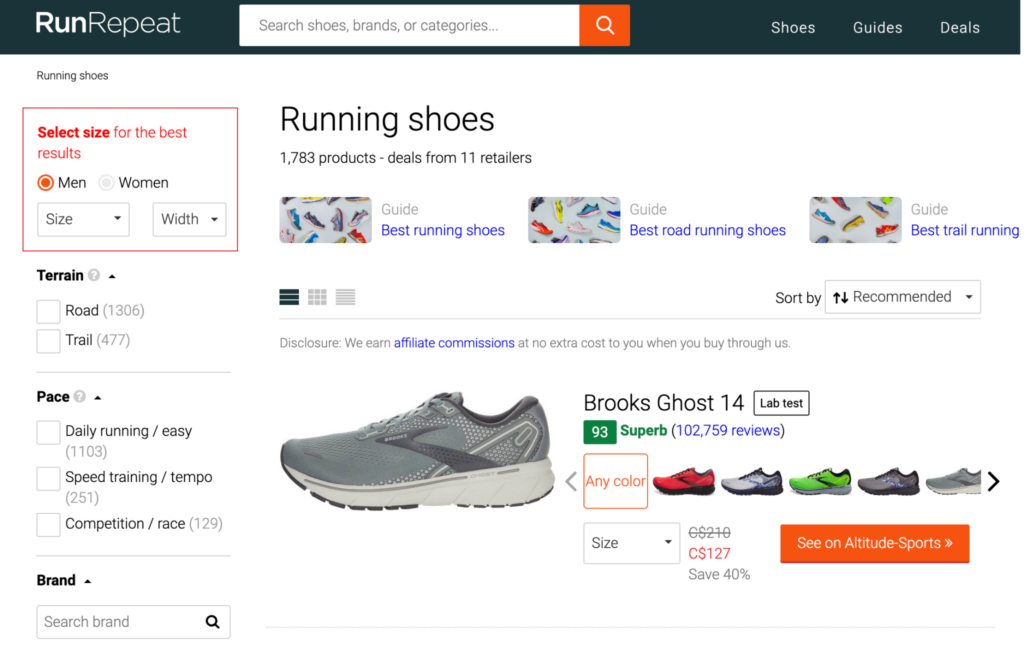
8. Houseplants
As with the niche site example above, “houseplants” culls its readership from a range of lifestyle enthusiasts—hard-core gardeners and aesthetic-driven Instagram influencers—using the overlap in categories to narrow down a niche. This niche website can easily fall under the keywords of either “DIY home decor” or “professional landscaping.”
Because readers can vary so broadly, Backyard Garden Lover’s particular niche offers an excellent opportunity to adjust tone or focus to a specific audience, encouraging traffic despite shared general content with many competing sites.
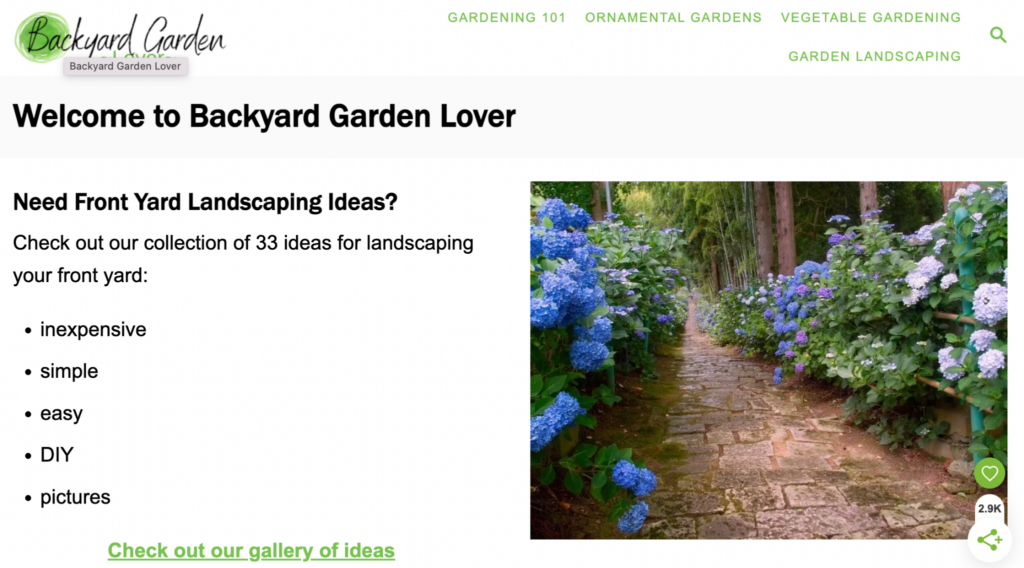
9. Video games
Yes, video games! There are countless blogs already devoted to this topic. They never go out of style because the subject is constantly being updated nd reviewed by a very active community.
While this is a larger niche topic under the umbrella category of “gaming” (and some might even say “competitive sports” or, in the industry, “e-sports”), the constant addition of games and new systems allows for continuously bloggable content.
Furthermore, the topic makes it an accessible niche site to share your thoughts and expertise, as Gamespot does.

10. Telescopes
Think of how many people look up “cameras”—it’s a smaller list than those who look up “phone cameras,” a two-word search that should ironically be more specific and niche. Now think of how many people look up “telescopes.” It’s not too dissimilar when you consider that many people search by association rather than specification.
However, when you examine what people are searching for—in this case, sharp, distant images—you’ll also find the kind of people searching for them. Telescopic Watch is a niche website that draws stargazers of all ages and provides telescope reviews and astronomy tips.

11. Coffee, cocktails, and BBQ
Lastly, and most commonly—food and drinks! We all love them. Food and drink is a daunting topic to take on broadly—not to mention highly competitive for traffic with the dozens of recipe sites—but that’s not to say specific kinds of drinks or food can’t be niche. They’re about the most popular niche websites out there.
The way that “curry” is a topic under “food” and “Asian” or “Southeast Asian,” so is “coffee” or “cocktails” under “beverage” and “specialty.” Just because something is popular doesn’t mean there aren’t particular branches to focus on—like sustainable coffee, coffee designs or artistry, or, in the cocktail world, the two substantial deviations between dark and clear liquor-based drinks. Food and drink niche sites don’t have to be about recipes—they can be about the dish's history or arrangement on the plate.
Your best bet when working on a competitive niche site idea—a niche topic with a broad audience—is to focus on one particular element for which you are knowledgeable or can consistently source new content. Cocktail Hammer, a cocktail passion blog run by two veterans, is a great example, narrowing the focus to accessible ingredients found at home.
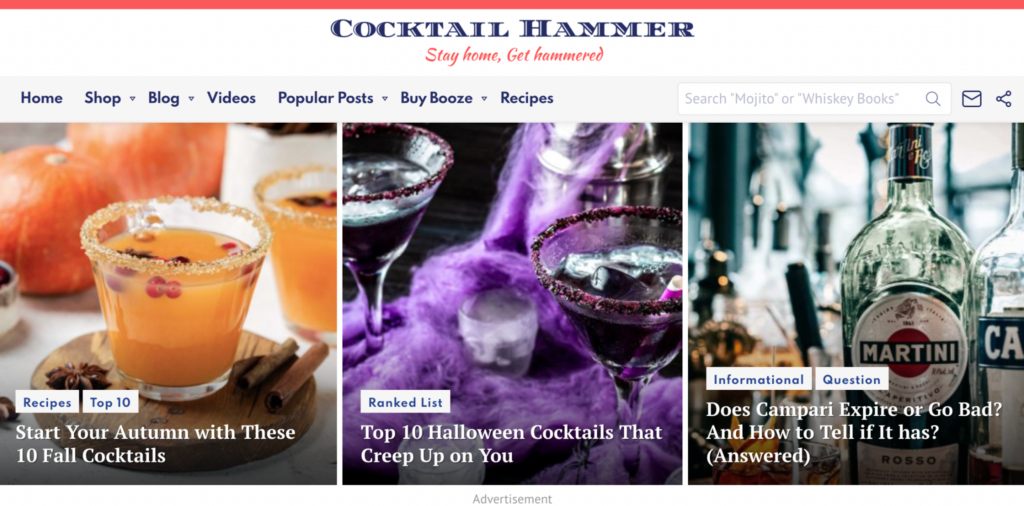
The 4 Key Elements of Successful Niche Websites
A successful niche website masters its specific topic and monetizes its traffic with affiliate links or ad streams. Typically, a niche site is informative rather than controversial, allowing aspiring bloggers to gain popularity through reputation and expertise.
1. Great content
Content is important for marketing, but especially for niche site audiences. This includes referencing other sources or an authority site that may have a deeper knowledge of relevant, adjacent subjects that add to your site’s credibility. In Google algorithm terms, that means EAT, or expertise, authority, and trustworthiness.
2. Search engine optimization (SEO)
Excellent and consistent content doesn’t always add up to what is most searchable—especially when you have title tags that are less witty but more in tune with searches. Keywords should be in the title and consistent with what the post is optimized for. Using “best” or “tips” in a title is a frequent example (this helps when articles link directly to an Amazon affiliate website).
3. Topic selection
The niche topic matters as well. Whether it is a product, service, or industry, there are likely broader categories and smaller topics to dive into. Seasonality or popularity will also determine the amount of content you can produce.
4. Competition level
Niche subjects can be ranked by interest level and competition level. Competition, in this case, is a combination of search results—a general search—and “intitle” search results, which show which results are geared directly toward the keyword. This trial search can help you identify high search volume and low keyword competition and assess whether it aligns with your niche interest and resource capabilities.
How a Niche Website Generates Profit and Revenue Streams
Ad revenue is the most common form of niche site monetization. Google AdSense is usually used to match display ads to content. In certain seasons, the site may be a form of passive income as it runs itself and directs users to an Amazon affiliate.
Increased traffic may allow for the lucrative (albeit time-consuming) options of selling your own ad space by researching custom user content or handing that process over to companies that help link your niche website to relevant advertisers.
Remember, ads pay per click. Titling any post with “best” will funnel buyers who expect affiliate product links—and give your niche site affiliate commissions.
In terms of relevancy and content, organic traffic can be reached through publishing as much optimized content as possible, whereas your content must be consistently fresh to build brand awareness.
Follow Your Passion and Build Your Best Niche Site
People commit to niche blogging out of passion, expertise, and revenue incentives. To create a successful niche website, consider your passions—then all the tools, services, and overlapping categories they involve:
- Is the content limited, or can it be updated?
- Is it a topic that’s up for debate?
- Would an affiliate be interested in your topic?
- Is this niche website idea too broad or too narrow?
Remember that creating and maintaining a site devoted to a specific topic must be sustainable. Your niche idea may not lead to passive income. So don’t be afraid to scope out the competition and assess your content strategy.
Do you have more info on niche sites? Do you have any other successful niche site examples? Feel free to comment below. And check out our podcast—we’d love to talk shop with you.
Related: How To Build Niche Affiliate Websites (with Doug Cunnington from Niche Site Project)


